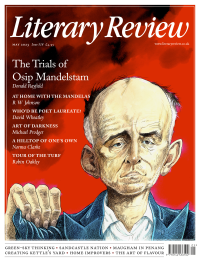Freya Johnston
She Bamboozled Lord Byron
Lady Caroline Lamb: A Free Spirit
By Antonia Fraser
Weidenfeld & Nicolson 224pp £25
Long before she delivered to her diary the famous verdict that Lord Byron was ‘Mad, bad and dangerous to know’, Lady Caroline Lamb – then Lady Caroline Ponsonby – had described herself in more or less the same terms. Aged eleven, she offered the following character sketch in a letter to her cousin: ‘I’m mad/That’s bad/I’m sad/That’s bad/I’m bad/That’s mad.’
Since Caroline remained in so many ways a naughty child, the eleven-year-old’s verse might stand as a potted autobiography. So too might a list of her early nicknames – ‘Ariel’, ‘Sprite’, ‘Savage’, ‘Squirrel’ – and the descriptions of herself that she included in her semi-fictional work Glenarvon (1816), written as her ‘sole comfort’ in the wake of an absurdly dramatic, calamitous affair with Byron. In this roman à clef, set in Ireland, Lamb casts herself as Calantha, daughter of the Duke of Altamonte, a wild heroine who resembles ‘a fairy riding upon a sun beam through the air, chasing the gay images of fancy’. An immediate bestseller (four British editions appeared within a year), the work was greeted with a mixture of admiration, bewilderment and derision. The Monthly Review, typical in calling Glenarvon ‘strange’, observed that it was ‘not without marks of genius’, but that these, combined with ‘revoltingly improbable’ incidents (suicide and infanticide among them), made the text difficult both to categorise and to stomach.
As a previous biographer, Elizabeth Jenkins, put it in 1932, Lamb ‘had the gifts of a novelist without being able to write a novel’. Her perceptions of character were often acute and she possessed an ear for the casual exaggerations and bitchiness of high-society chat. She can sound

Sign Up to our newsletter
Receive free articles, highlights from the archive, news, details of prizes, and much more.@Lit_Review
Follow Literary Review on Twitter
Twitter Feed
Richard Flanagan's Question 7 is this year's winner of the @BGPrize.
In her review from our June issue, @rosalyster delves into Tasmania, nuclear physics, romance and Chekhov.
Rosa Lyster - Kiss of Death
Rosa Lyster: Kiss of Death - Question 7 by Richard Flanagan
literaryreview.co.uk
‘At times, Orbital feels almost like a long poem.’
@sam3reynolds on Samantha Harvey’s Orbital, the winner of this year’s @TheBookerPrizes
Sam Reynolds - Islands in the Sky
Sam Reynolds: Islands in the Sky - Orbital by Samantha Harvey
literaryreview.co.uk
Nick Harkaway, John le Carré's son, has gone back to the 1960s with a new novel featuring his father's anti-hero, George Smiley.
But is this the missing link in le Carré’s oeuvre, asks @ddguttenplan, or is there something awry?
D D Guttenplan - Smiley Redux
D D Guttenplan: Smiley Redux - Karla’s Choice by Nick Harkaway
literaryreview.co.uk